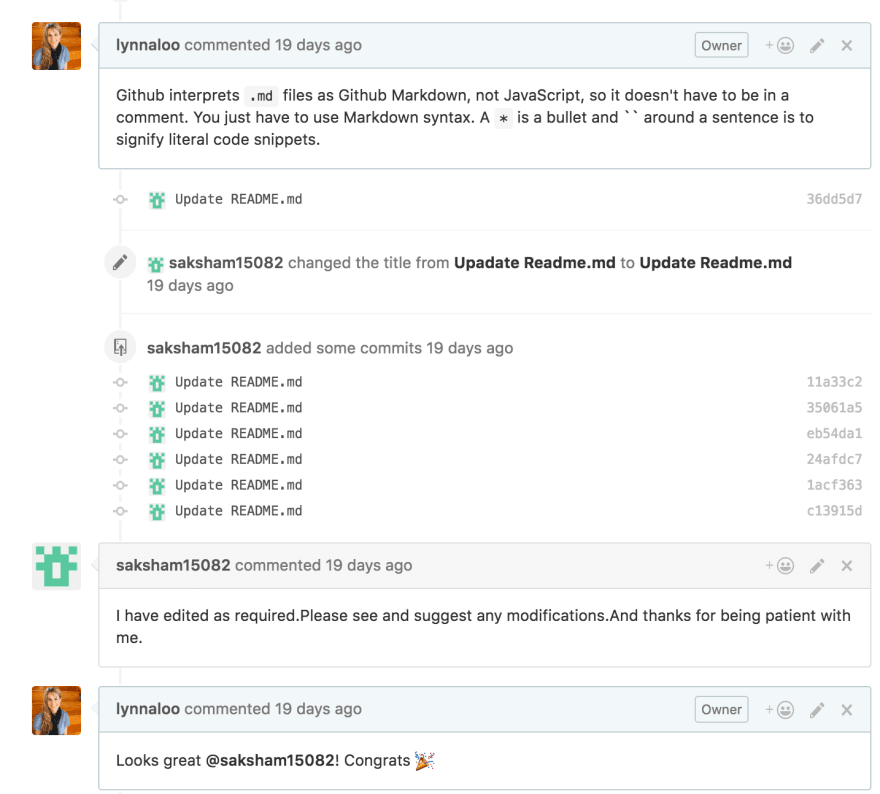This year marks my fifth year participating in #hacktoberfest and celebrating open-source software. This year, instead of a t-shirt, they'll plan you a tree for your pull-requests! 🌳🌳🌳🌳
During my second Hacktoberfest, I wrote a short blog about my experience as a maintainer of Oran.js with my friend and then co-worker Troy Connor. Oran.js is a fictional application about orange cats pets that went from straight markdown to a fully-functional web application during October 2016. This is a re-post of that story to celebrate yet another year of writing and maintaining open-source software. I hope you enjoy and participate this year!
To participate in Hacktoberfest, developers need to register through the website and then issue four pull requests to public GitHub repositories between October 1st and October 31st. These pull requests can be full features, bug fixes, or even just changes to documentation. It’s open to those who have been using GitHub for years and those who are complete beginners. At the end of the month, sponsoring partners DigitalOcean and GitHub reward open-source contributors for their work with a special commemorative t-shirt. (note from 2020: now just Digital Ocean and it's a t-shirt OR a tree!)
The t-shirt prize is nice for participants, but the much bigger reward is the growth in the open-source development community. The number of first-time contributors and volume of overall contributions increases exponentially during this celebration. During Hacktoberfest 2015, there were more than 48,000 pull requests issued in 12,000 projects.
Project maintainers looking for help from aspiring Hacktoberfest contributors can mark new or existing issues with the hacktoberfest tag. Then, participants who aren’t sure where to begin can search for that same tag. The ETA development team earned our Hacktoberfest pull request credits by working on open-source projects in our GitHub organization, fixing issues in the projects that we use, and by adding features to some fun projects.
As we started participating in Hacktoberfest as a development team, the obvious goal was to give back to the open-source community (well, and maybe win that cool t-shirt). The unforeseen benefit, however, has been the social aspect. By adding the "hacktoberfest" tag to your issues, you’re attracting helpful people to your project that you might otherwise have never even interacted with. Through this tag, you begin collaborating with, teaching, and learning from other developers from around the world.
We found that README.md changes and "easy" fix issues were attractive to students and developers that were new to the open-source ecosystem. Even with a simple issue, beginners can learn how to submit a pull request, how a code-review works, and how to rebase upstream changes as other issues are being fixed. We used this as a chance to teach the basics of open-source development and to show how GitHub can be an empathetic and helpful environment.
We were also really impressed by the quality of submissions and the obvious effort that contributors put into their pull requests. In several cases, they fixed the issue at hand and found some other improvement to add based on their own experience.
There's not much time left in the month of October for Hacktoberfest, but you can get involved in open-source at any time. Even an issue for the smallest documentation fixes can bring awareness to your project and allow you to interact with the community. If you enjoy education, you can teach something to someone new. If you want to learn, you can ask questions in the comments of an issue or pull request and start a conversation with someone new in the community.
Many thanks to the sponsors this celebration and we’re looking forwarding to seeing what happens in the final hours of Hacktoberfest 2016.
This was a repost of the story of our experience in 2015, but I've participated every year since the start and I looked forward to this every year. More technical and non-technical people are introduced to open-source every year because of this celebration and that's awesome!
Take a peek at the commmits on Oran.js and see how it evolved from straight markdown to becoming an Express.js application in a Docker container. All work done by new contributors to open-sourse!
Hacktoberfest 2020 Resources












Top comments (0)